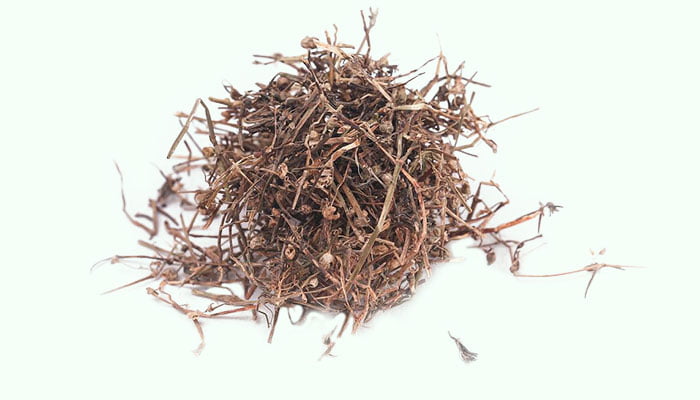What Is Bai Hua She She Cao
Bai Hua She She Cao is also known as Snake Needle Grass, Spreading Hedyotis, Oldenlandia Diffusa, or Hedyotis Diffusa, which is an annual herb belonging to the family Rubiaceae. It is a relatively practical and common Chinese herbal medicine, which first appeared in <Guang XI Zhong Yao Zhi> (List of traditional Chinese medicine resources in Guangxi) in 1,959 AD.
This plant is not drought tolerant and likes a warm and humid environment. It often grows in wet fields, roadsides, riversides, and grasslands. It is distributed in China, Japan, India, and Nepal.
Every summer and autumn, people gather Hedyotis Diffusa, remove their impurities, wash them with water, dry them in the sun, cut them into segments, and make them into Chinese herbal medicines.

Bai Hua She She Cao contains arborinone, isoarborinol, lupenylacetate, geniposidic acid, deacetyl aspemloside, deacetylasperulosidic acid methyl ester, asperuloside, asperulosidic acid, desacetyl asperulosidic acid, scandoside, seandoside methyl ester, kaempferol, quercetin, β-sitosterol, stigmasterol, daucosterol, ursolic acid, oleanolic acid, ferulic acid, caffeic acid, succinic acid, phenylpropanoids, coumarins, alkaloids, amino acids, volatile oils, anthraquinones, polysaccharides, and a variety of trace elements.
According to the Chinese Pharmacopoeia, the medicinal nature of Bai Hua She She Cao is relatively cold, with a slightly bitter and sweet taste. It has a certain therapeutic effect on the pathological changes of the stomach, large intestine, and small intestine meridians.
In recent years, it has been widely used to clear heat and remove toxins, drain dampness, treat skin ulcers, chronic hepatitis B, non-lymphocytic leukemia, pneumonia, cholecystitis, simple appendicitis, pelvic inflammation, rheumatoid arthritis, chronic nephritis, recurrent stomatitis, acne, snake bite and a variety of cancers.
There are about 50 kinds of Chinese medicine prescriptions containing Bai Hua She She Cao, such as Shuang Hu Qing Gan Granule, Yangzheng Xiaoji capsule, and Huahong Capsule.
Benefits
- Anti-inflammation, anti-fatigue, and anti-mutagenesis.
- Anti-oxidation, scavenging hydroxyl free radicals and DPPH free radicals.
- Promoting bile secretion, having analgesic, sedative, and hypnotic effects.
- Reducing the damage of CCL4 to liver tissue and protecting the liver.
- Promoting the proliferation of T and B lymphocytes and improving specific and non-specific immunity.
- Inhibiting the development of spermatogonia into primary spermatocytes and reducing the number of sperm.
- Removing heat toxins, treating sores and carbuncles caused by heat toxins.
- Draining dampness, treating difficult and painful urination, jaundice caused by damp-heat.
- Relieving sore throat, intestinal abscess, lung abscess, and snakebite.
- Inhibiting Pseudomonas aeruginosa, Escherichia coli, Staphylococcus aureus, typhoid bacillus, Proteus, Salmonella, Streptococcus, and Pasteurella multocida.
- Studies have confirmed that it contains a variety of anti-cancer active ingredients, which can inhibit the proliferation of human androgen-sensitive prostate cancer cells, Hela cells, HO-8910 ovarian cells, K562 cells, HL-60 cells, A549 lung cancer cells, SMMC-7721 cells, and induce apoptosis of MCF-7 cells, HT-29 colon cancer cells, HepG2 cells, RPMI8226 myeloma cells, SGC-7901 human gastric cancer cells.
Combinations
- It can be used in combination with Jin Yin Hua (Flos Lonicerae), Lian Qiao (Fructus Forsythiae), Ye Ju Hua (Wild Chrysanthemum Flower), etc. to treat sores and carbuncles caused by heat toxins.
- It can be used in combination with Hong Teng (Sargentodoxa Cuneata), Bai Jiang Cao (Patrinia), Mu Dan Pi (Cortex Moutan), etc. to treat acute appendicitis.
- It can be used in combination with Huang Qin (Radix Scutellariae), Xuan Shen (Radix Scrophulariae), Ban Lan Gen (Radix Isatidis), etc. to relieve a sore throat.
- It can be used in combination with Ban Zhi Lian (Scutellaria Barbata), Zi Hua Di Ding (Viola Yedoensis), Chong Lou (Rhizoma Paridis), etc. to treat snake bites.
- It can be used in combination with Bai Mao Cen (Rhizoma Imperatae), Che Qian Cao (Plantago Asiatica), Shi Wei (Folium Pyrrosiae), etc. to treat difficult and painful urination caused by damp-heat.
Side Effects
- Bai Hua She She Cao has been used clinically for many years, with few side effects.
- Individual patients taking it may cause dry mouth, nausea, vomiting, dizziness, itching, pimples, or difficulty breathing.
- Its injection can cause a slight decrease in the number of white blood cells. The white blood cells returned to normal about 1 week after drug withdrawal.
Precautions and Warnings
- The dosage of Bai Hua She She Cao should be controlled at 15-60g.
- It can be made into decoctions, injections, or mashed for external use.
- People who are allergic to Bai Hua She She Cao should not take it.
- Patients with deep abscesses should not take it.
- Patients with deficiency-cold in the spleen and stomach should not take it.
- Pregnant women and children should not take it.
